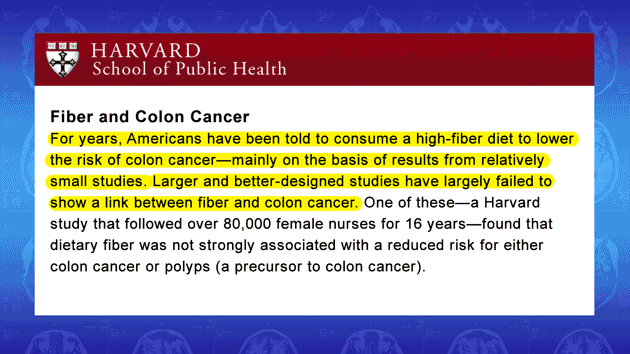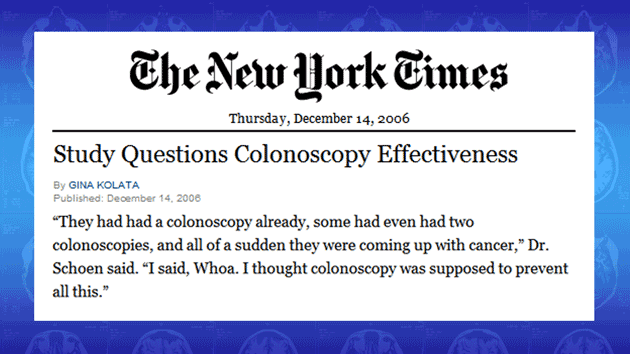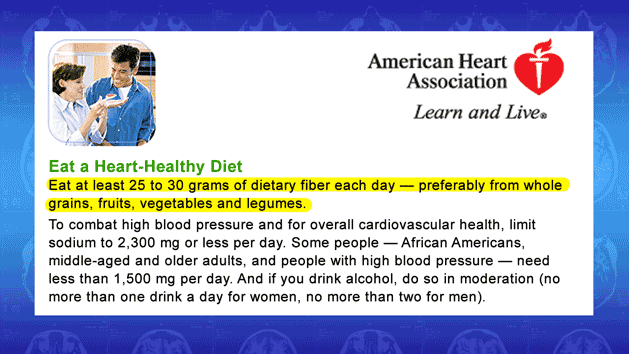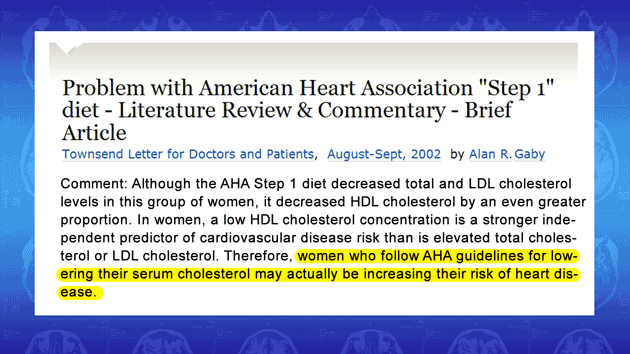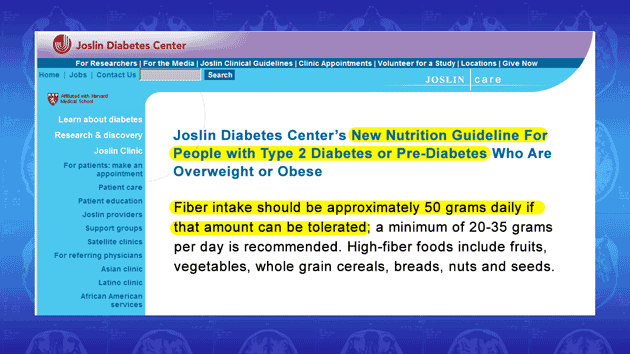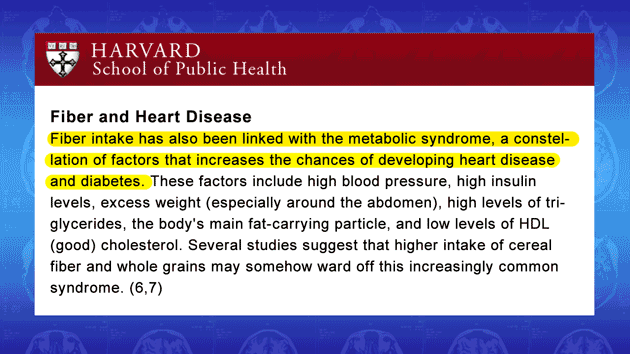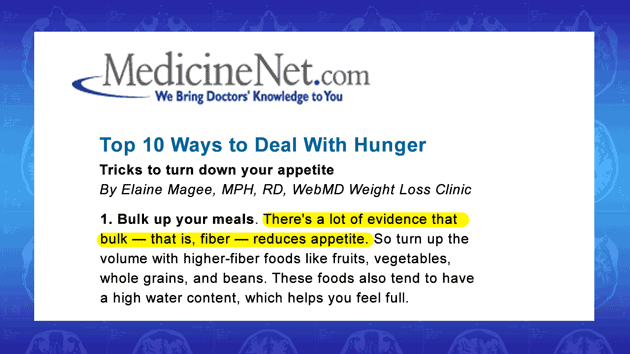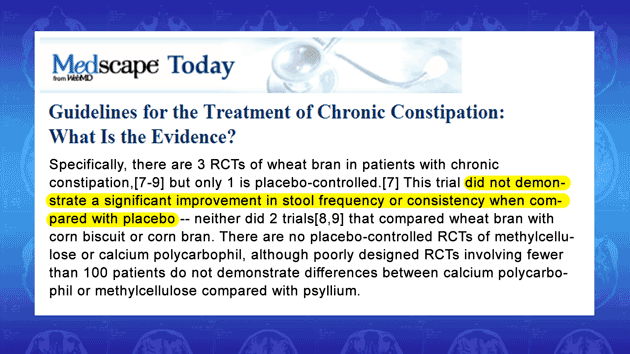What is so menacing about dietary fiber?
You probably believe fiber prevents colon and breast cancer, lowers cholesterol, reduces the risk of heart disease, regulates blood sugar, wards off diabetes, curbs the appetite, induces weight loss, cleanses the colon, arrests diarrhea, and unplugs constipation. Tragically, none of this is true!
In fact, fiber-rich foods and fiber supplements are either the primary cause of most of these conditions, or major contributors. Please watch my investigative report to learn the truth. If you consume fiber for any health reasons, the next 14 minutes will turn your life and health around:
Transcript and Additional
Commentaries by Author
Click the [link] or picture to view the source site or document in the new window (when available). The references for this page were compiled in October 2008. Some of the links may not match at a later date because publishers may revise their web sites. In this case, try searching cached pages on Google, or contact the respective publishers.
Introduction
Greetings! My name is Konstantin Monastyrsky (bio). I am a medical writer, performance nutrition consultant, and an expert in forensic nutrition (background). Unlike orthodox nutrition, which promotes healthy foods, forensic nutrition studies why supposedly healthy foods make people sick.
Dietary fiber is a good case in point. My book Fiber Menace has stirred a huge controversy among experts recently because it describes how and why fiber causes constipation, hemorrhoids, irritable bowel syndrome, diverticular disease, ulcerative colitis, Crohn's disease, colon cancer, and contributes to fifty plus other digestive, endocrine, colorectal, and genitourinary disorders.
Just wanted you to know that i watched your video and it absolutely blew me away. i love the fact that everything is substantiated with medical studies. what you say is tough to swallow, but i am going to have to examine it and change my approach to diet because the evidence is so overwhelming. Thanks!E.P., USA (via e-mail)
In other words, dietary fiber, presumably a health food, is actually screwing up your health big time! This is exactly what I meant by picturing a cereal bowl full of brass screws on this cover!
And yes, I realize that you are very, very skeptical:
— How can, Mr. Monastyrsky, all this be true, when everyone is telling me otherwise?
Well, not long ago 'everyone' was recommending Hormone Replacement Therapy [1] and Vioxx, and a lot of people ended up dead. So I can't answer for everyone. I can, however, present you with the facts, and you make your own conclusions:
False claim #1: Dietary fiber prevents colon cancer
The truth is, fiber is one of the primary causes of polyps and lesions that precede colon cancer. I'll start with a widely promoted lie that fiber prevents colon cancer.
This quote [2] is from The Harvard School of Public Health's web site [link]:
This one, of all people, from the United States Federal Drug Administration [link]:
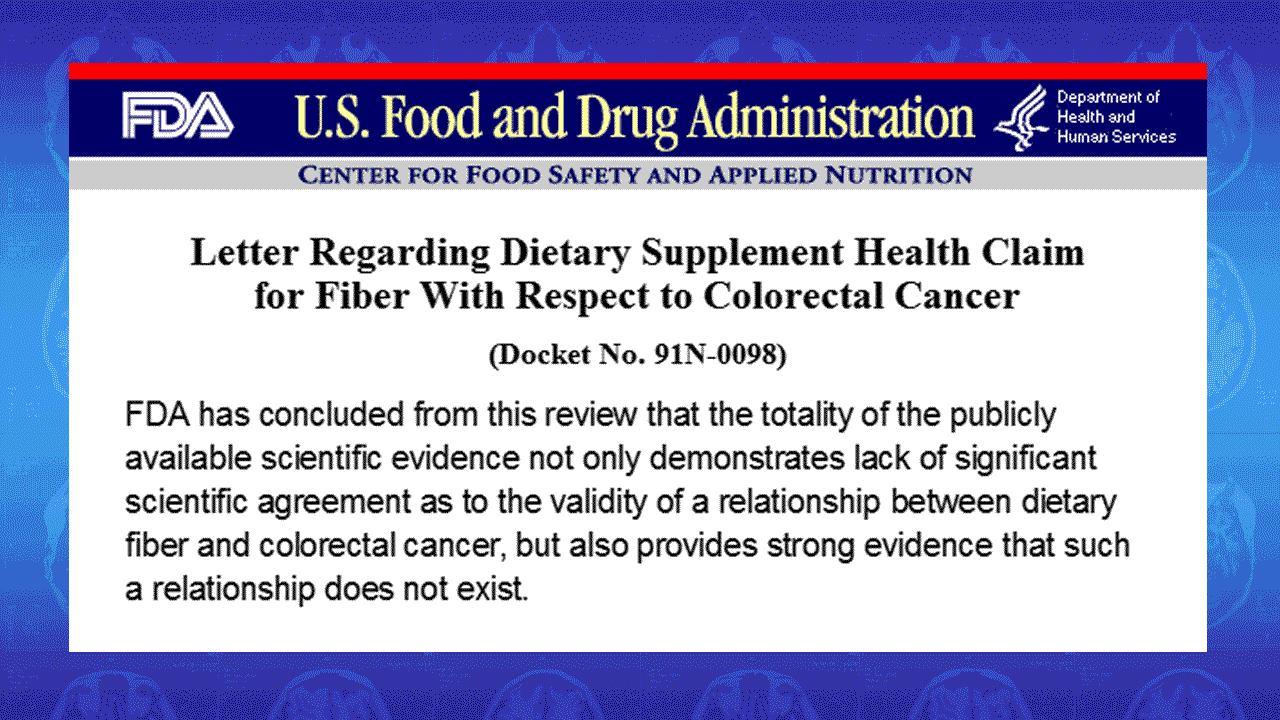
On top of this damning evidence, Fiber Menace lists a number of mainstream studies that actually demonstrate the connection between fiber consumption and polyps, which precede colon cancer.
But the really bad news doesn't stop there... If you are counting on regular colonoscopies to take out these polyps, don't hold your breath [link]:
What else can I add?
False claim #2. Fiber prevents breast cancer
The truth is, carbohydrates in fiber-rich products increase the risk of breast cancer. Another fiber-related lie concerns breast cancer. In fact, it's the complete opposite - a high-fiber diet actually doubles the risk of breast cancer!
As you know, natural fiber is an indigestible carbohydrate. It is found in fruits, vegetables, grains, nuts, and legumes along with five to ten times as many digestible carbohydrates:
...recommends the American Heart Association [link], and pretty much everyone else.
But if you follow this misguided advice literally, along with fiber you will also unwittingly ingest up to 300 grams of digestible carbohydrates each and every day. And that is before adding up all the other carbs consumed throughout the same day with soft drinks, juices, milk, side dishes, snacks, and deserts.
So what has this to do with breast cancer? Well, when the United States Centers for Disease Control and Prevention and the American Institute for Cancer Research studied [3] diets, high in carbohydrates, here is what they found out [link]:
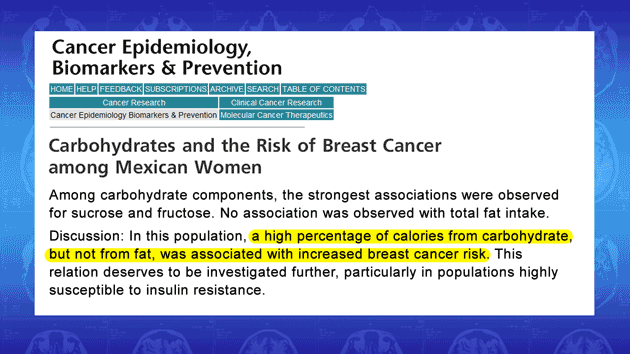
In fact, the association was so bad — 220% increase in breast cancers for those who were getting over 60% of their calories from carbs - they canceled the study.
Not surprisingly, breast cancer deaths in the United States are among the highest in the world?
False claim #3: Fiber reduces the risk of heart disease
The truth is, fiber along with a low-fat diet increases the risk of heart disease. The next popular lie — that fiber reduces the risk of heart disease — is just as outrageous. It is based on yet another intentional lie that fiber lowers cholesterol.
Actually, it doesn't! Not a tiny bit... This sleight of hand only works in combination with a very low-fat diet, that lowers cholesterol anyway with or without fiber. Even then, the reduction is so small, it is absolutely meaningless.
And guess what? When the scientists investigated this reduction among women, they found out that it is mostly the good HDL cholesterol that goes down, not the bad one:
...wrote Dr. Allen Gaby for the Townsend Letter for Doctors and Patients [link].
You can learn more about the connection between fiber and heart disease from my investigative report: Dietary Fiber: Heart savior from Heaven, or A Death Wish From Hell.
If you are truly concerned for your health, life and future [4], make sure to watch it!
False claim #4: Fiber protects people from diabetes
The truth is, sugars and starches in fiber-rich products cause diabetic complications. The next lie is really 'sweet' — a claim that fiber somehow may protect you from diabetes.
Just consider these outlandish recommendations by the Joslin Diabetes Center, an affiliate of the Harvard University's Medical School, which also claims to be "the world's largest diabetes research center, diabetes clinic, and provider of diabetes education" [link]
Here is what they advise to their unsuspecting patients [link]:
So let me ask you this simple question: How can fiber in fruits and vegetables — a carbohydrate along with a load of sugars and starches — protect you from sugar diabetes, when even the village idiot knows that sugars and starches in excess are THE NUMBER ONE cause of non-insulin dependent diabetes?
From all the lies about fiber, this one is the most obscene for two reasons:
— First, indigestible fiber is a primary cause of juvenile diabetes. A child's duodenum is so tiny, it gets easily clogged with fiber. The resulting obstruction blocks pancreatic and bile ducts, which, in turn, causes pancreatic inflammation, damages insulin-secreting cells, and forever ruins the lives of children and their parents [5].
— Second, fiber, particularly in the insane amounts recommended by the Joslin Center, dramatically increases the damage from adult type II diabetes by interfering with the daily measurements of blood glucose levels, and by blocking the assimilation of medication and essential nutrients. [6]
Besides, this is a case when one hand doesn't know what other one is doing. Just consider this quote from the Harvard School of Public Health Web Site [link]:
So much for the Harvard University's vaunted leading edge science...
Author's comment: The above quote is somewhat ambiguous. Some read it as ”pro fiber,” while [at the time of producing this report] I was clearly reading it as stating what I believe it is stating — that fiber "has also been linked with the metabolic syndrome, a constellation of factors that increase the chances of developing heart disease and diabetes.”
It is very well may be that I am misreading this quote, but it doesn't change a bit the preponderance of facts “against fiber“ discussed in this report, throughout my book, and the rest of this site.
It is also plausible that this particular paragraph is intentionally ambiguous because its authors are simply hedging their position in order to avoid latter day mea culpa as was the case with persistent lies related to fiber's protective properties against colon cancer.
In retrospect, I regret including this quote into my report because its two-edged interpretation negatively affects the quality and integrity of this report.
False claim #5. Fiber reduces appetite
The truth is, fiber stimulates appetite and overeating, contributes to weight gain and obesity. The next widely popular lie concerns obesity. Everyone knows that fiber is broadly recommended for weight loss because, supposedly, it reduces appetite [link]:
Again, not true, according to the Human Nutrition Research Center on Aging at Tufts University [link]:
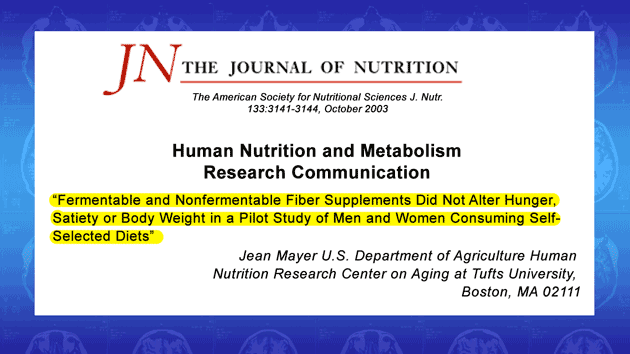
In fact, it's the complete opposite: fiber-rich food expands the stomach by its sheer weight, volume, and water absorbency. This, in turn, raises the threshold of satiety, stimulates appetite, and makes you much hungrier the next time around.
And that's even without reminding you yet again that anytime you consume fiber, you also consume a ton of carbs - the mother of all weight gain.
False claim #6: Fiber has zero net calories
The truth is, fiber contains calories just like any other carbohydrate. Another popular lie related to weight loss claim is that fiber has 'zero net carbs...'
Not true by a country mile... According to the Dietary Reference Intakes for Energy, Carbohydrate, Fiber, Fat, Fatty Acids, Cholesterol, Protein, and Amino Acids (Macronutrients) - that's the nutritional bible published by Uncle Sam's National Academies Press - fiber fills you with calories just like any other food [link]:
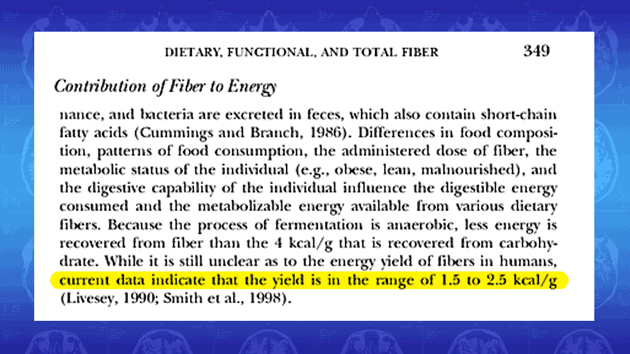
So, If you consume daily thirty five grams of recommended fiber, that adds up to over twenty to thirty thousand extra calories in a single year. Not exactly 'net zero...'
False claim #7. Fiber keeps the colon clean
The truth is, fiber slows colon motility and causes congestion [of stools]. No lie can compete in popularity with the claim that fiber keeps the colon clean because it speeds up elimination!
Not true [7], according to the highly respected and authoritative Rome II : The Functional Gastrointestinal Disorders:
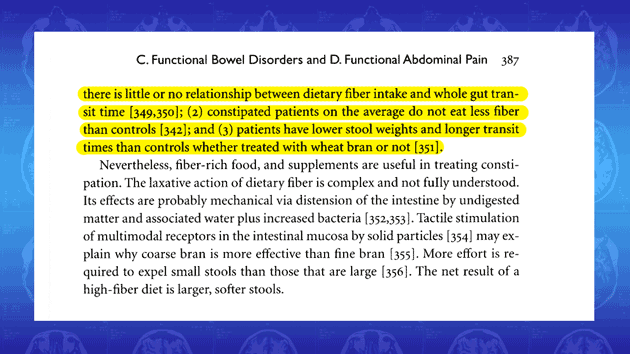
In fact, as I explain in Fiber Menace, fiber delays and extends gut transit time more than any other food ingredient, and it is the number one cause of chronic constipation, hemorrhoids, diverticulosis, ulcerative colitis, and Crohn's disease.
So If anything, fiber makes your colon really clogged, and really dirty...
False Claim #8. Fiber relieves chronic constipation
The truth is, fiber is the primary cause of chronic constipation. For the same false reasons that people believe in the cleansing prowess of fiber, everyone and their uncle also believes that fiber relieves constipation.
Not true. According to the experts from the American College of Gastroenterology's Functional Gastrointestinal Disorders Task Force, all legitimate clinical trials "did not demonstrate a significant improvement in stool frequency or consistency when compared with placebo." [link]
In plain English, it means fiber is no better at relieving constipation than a sugar pill. Indeed, how could it be, when fiber causes constipation in the first place! Again, I describe the exact reasons behind the fiber-constipation connection in Fiber Menace.
Finally, consider the stern warnings, that accompany Metamucil , a popular fiber supplement made from psyllium:
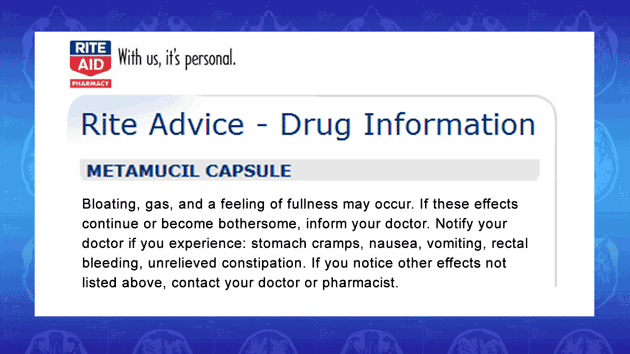
That doesn't describe a health food, does it?
Conclusion: So what is so menacing about fiber?
Nothing, if you are lucky enough to sell it...
At this point the following question may be nagging your mind:
— Why, then, Mr. Monastyrsky, despite all of this damning evidence, is fiber still being promoted and praised from all quarters as if it is manna from heaven?
[Brief soundtrack of the Money song from the Cabaret musical]
That's the answer to your question!
- You see, making cereals from wheat bran - a traditional, cattle feed — is just as profitable as printing paper money...
- Turning chicken feed from India into Metamucil and selling it for ten-fifteen bucks a bottle beats selling dope, and it's absolutely legal to boot.
- Finally, the more people get sick from fiber, the more money will be made on tests, drugs, surgeries, and hospital stays...
In other words, business as usual...
Well, these were all true facts about fiber's purported health benefits! And I hope you've noticed that my analyses were based entirely on mainstream sources of medical information, nothing from the fringes, not a bit.
You'll find plenty more equally disturbing facts from similar sources in my book and on my site, so I hope you'll study both, and reduce your consumption of processed and supplemental fiber accordingly.
Rest assured, I am not on a crusade to kill off all traces of fiber in favor of another extreme. In fact, the very first chapter of Fiber Menace opens with the following sentence [link]:
“If you consume minor quantities of fiber from natural, unprocessed food, there isn't anything wrong with it...”
My beef, as I said, is with too much processed fiber and the resulting digestive, metabolic, and cardiovascular disorders.
So if anyone tells you, that my book or my recommendations are extreme or not mainstream, it's a lie...
And consider this undeniable fact: The people of Japan enjoy the highest longevity in the world. And guess what? The traditional Japanese diet - based around fish, sea food, and white rice - is practically fiber-free? [8]
Finally, never forget - kids don't choose their foods, parents do! So, please, choose wisely, because fiber harms young children much, much more than adults, and the damage is oftentimes irreversible.
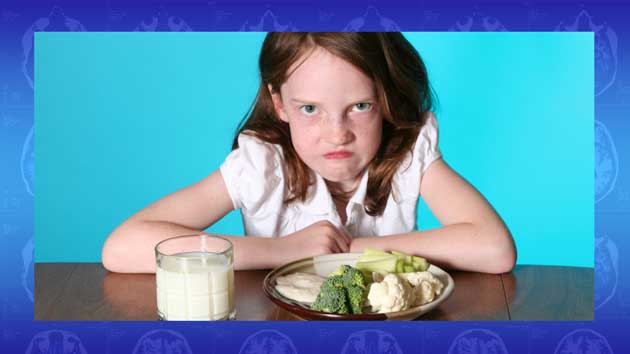
Thank you for watching!
I wish you and your family good luck and good health!
You can click the Backspace key on your keyboard or the browser's Go back button to return to the referring text.
[1] I describe the similarities between the Hormone Replacement Therapy fiasco and the 'therapeutic' use of fiber in human nutrition in the essay Bulls' S..t in the China Shop.
[2] Most of the illustration in the video and on this page were reformatted to accommodate the small screen size of the web-based video. Click the picture or related text link to review the original text in full.
[3] The Centers for Disease Control and Prevention and The American Institute of Cancer Research provided the funding, while the study itself was conducted by an independent team of researches. To my amazement, I could no longer locate any meaningful references to this study on the sites of either organization. It appears they've 'buried' it because its findings contradict the entire doctrine of cancer prevention [i.e. the recommendation to consume 5 to 10 servings of fresh fruits and vegetables daily].
[4] You aren't likely to learn about this subject (i.e. fiber-heart disease fraud) anywhere, but on these pages and from my video report. The adverse connection between fiber and heart disease is a taboo subject amongst the mainstream media because its heaviest promoters — Kellogg & Co, General Mills, Quaker Oats, or Procter & Gamble, — also happen to be among the nation's largest advertisers, sponsors, lobbyists, and political contributors.
This self-perpetuating 'conspiracy' and self-censorship has already affected my work in a profound way. The Washington Post spent close to two months in the summer of 2008 developing my profile, including extensive vetting all the way back to my elementary school, and a day-long photography session with a celebrated photographer. But when my profile was ready to go to press, it was 'killed' by the higher-ups for reasons I still don't know. Imagine that...
Indeed, why give prominence to the 'radioactive' medical writer and researcher whose books and views may offend your most lucrative advertising accounts. The reader's health and wellbeing? When huge profits are at stake, that is someone else's problem.
[5] I believe I am the first researcher to identify and describe the connection between fiber and juvenile (insulin-dependent) diabetes. A more thorough discussion of this issue is presented here.
[6] The following excerpts from the MedlinePlus web site [link] — a service of the U.S. National Library of Medicine and the National Institutes of Health — amend and confirm all of the statements I am making in the video regarding fiber-diabetes related risks (highlighted items are of particular concern to diabetics):
“Due to potential reductions in blood sugar levels caused by psyllium, requirements for insulin or other diabetes drugs in diabetic patients may be reduced. Blood glucose levels should be closely monitored, and dosing adjustments may be necessary [to prevent severe hypoglycemia or syncope (fainting) — KM].
Other drugs may be affected by psyllium, including anticoagulants, antidepressants, anti-gout agents, anti-inflammatory agents, diuretics, salicylates, tetracyclines, nitrofurantoin, insulin, lithium (Lithobid®, Eskalith®), and digoxin (Lanoxin®). People should speak with their healthcare providers before taking psyllium. Dosing adjustments may be necessary.
Psyllium-containing products may delay gastric emptying time [this particular warning echoes the above commentary regarding Dr. Bernstein — KM] and reduce the absorption of some herbs, supplements, vitamins, or minerals. Absorption of calcium, iron, zinc, and vitamin B12 may also be affected. Other agents should be taken one hour before or a few hours after psyllium to avoid potential interactions [This recommendation (i.e. few hours before or after) is grossly incorrect — the normal transit time of fiber through the stomach and small intestine is at least 20 to 30 hours in young and healthy adults, and substantially longer in older persons. Throughout all this time fiber will continue affecting the absorption of carbohydrates, medication, and ensuing blood sugar. — KM]
Taking psyllium with herbs and supplements that alter blood sugar may increase the risk of hypoglycemia (lowered blood sugar). People using other herbs or supplements that may alter blood sugar levels, such as bitter melon ( Momordica charantia ), should be monitored closely by their healthcare provider while using psyllium. Dosing adjustments may be necessary."
Please keep in mind that the argument “this doesn't apply to all fibers, only to psyllium” isn't correct. All fibers impact digestion and intestinal absorption in similar ways. In other words, what's true for psyllium, is also true for all other fibers.
[7] As you continue reading this quote, you'll be struck (as I was) with the author‘s' timidity. First, they say, fiber doesn't do a thing. Second, immediately thereafter, they 'hedge their bets' by adding: “Nevertheless, fiber-rich products, and supplements, are useful in treating constipation.”
Obviously, the doctors who wrote and edited this book aren't stupid or ignorant. It appears they simply 'play along' by yielding to the incredible peer pressure emanating from the 'fiber mafia.' And, incidentally, none of the pro-fiber arguments that they cite are true either. The factual connection between fiber and constipation is explained here.
[8] My statement regarding "traditional Japanese diet" being "practically fiber-free" isn't entirely accurate — the people of Japan do consume foods that contain fiber. The most popular among them are gobo (burdock root, 1.8 g of fiber per 100 g), yamaimo (Japanese yams, 3.9 g of fiber per 100 g), satoimo (taro, 5.4 g of fiber per 100 g), brown rice (1.6 g of fiber per 100 g), millet (1.3 g of fiber per 100 g), natto (fermented soybeans, 5.4 g of fiber per 100 g), and some others.
In the context of the Japanese diet, these relatively low fiber tubers, leafs, grains, and legumes are consumed in moderation as snacks; side dishes along with fish, seafood, or meats; or the ingredients of stews, soups, and salads.
Considering the fact that an average Japanese adult eats less food throughout the entire day than most Americans ingest in a single dinner, their overall intake of natural fiber is well within a range recommended in my book:
“If you consume minor quantities of fiber from natural, unprocessed food, there isn‘t anything wrong with it, because (a) small amounts of natural fiber (which is mostly soluble) will not obstruct your intestines or cause diarrhea, (b) most of it will get fermented in the large intestine, and (c) the remainder will not bulk up the volume of stool high enough to cause any damage from “roughage.” [link]
All that stated, people who took me to task for being presumptuous have made a valid point, and I need to be more thorough while casually addressing these controversial and emotionally-charged subjects.

